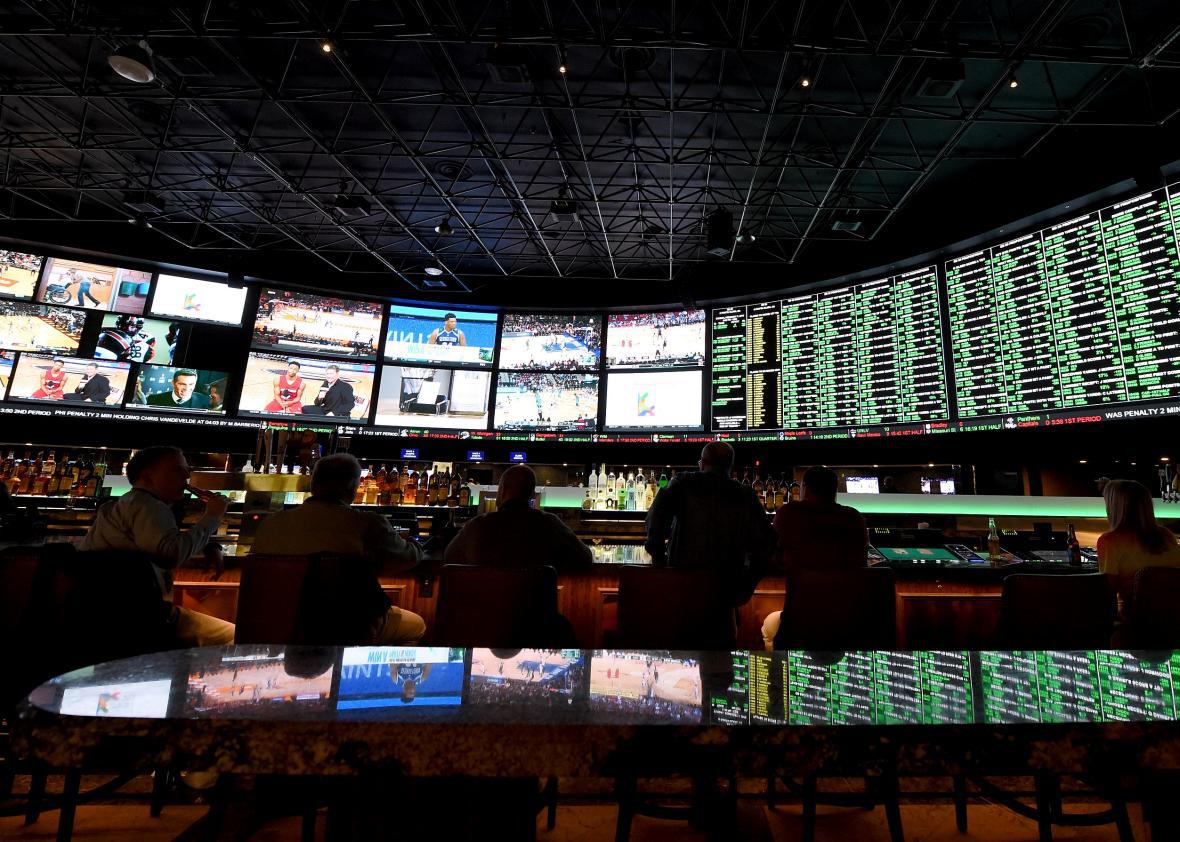For the first time in almost two decades, it’s legal for Americans to bet on the Olympics on U.S. soil. But despite the star power of Simone Biles, Katie Ledecky, Michael Phelps, and Carmelo Anthony—and the lure of bizarre sports, thousands of competitors, and endless gambling opportunities—Vegas is finding gamblers reluctant to bet on the games.
This is the first time many Vegas oddsmakers have prepared lines for sports like table tennis, and they’ve conceded that in many cases their expertise may be outmatched by that of their patrons. As a consequence, they’ve put lower bet limits on handball than on soccer, and they’ve excluded many events entirely.
Casinos won’t be devastated by all this low rolling. Industry types anticipated the Rio Games would be a modest attraction during the lull that precedes the NFL season. Jay Rood, the vice president of race and sports at MGM, thought Nevada might see $20 million to $30 million in bets on the Olympics—about half the total of an average Sunday of pro football, and a fraction of the state’s 2015 handle of $4.2 billion. (That number, meanwhile, is just a fraction of the estimated $400 billion Americans bet illegally on sports each year.)
Rood told me that the betting on the Olympics as a whole has been equivalent to a big regular-season baseball game, with basketball and golf getting particular attention. Westgate Las Vegas Resort & Casino put its lines up at the beginning of June, but on the eve of the games had yet to see much action outside of basketball and soccer. Things could still improve as various sports move toward their gold-medal finals, but so far, the Olympics’ return to casino floors, 15 years after Sen. John McCain pushed to ban gambling on most amateur sports and 18 months after the Nevada Gaming Commission made an exception for the Olympics, has been a muted affair.
There are a number of reasons for this, suggested Gary Trask, the managing editor of Casino City Times, an industry publication. One might be that the American athletes we love are very, very good at the sports they compete in.
Say you’re a newfound fan of the American archer Brady Ellison, who some say resembles Leonardo DiCaprio. Ellison defeated Ali El Ghrari of Libya in a match on Tuesday afternoon. Ladbrokes, the British gambling site, had the Libyan at 25-to-1; Ellison was at 1-to-1,000, meaning you’d have had to wager $1,000 to win $1.
The problem goes beyond archery. Here are some gold-medal odds on American favorites from William Hill, which takes bets in Vegas. You’d have to bet $160 to make $10 on a U.S. men’s basketball gold medal. You’d have to bet $145 to make $10 on U.S. women’s basketball gold. You’d have to bet $100 to win $10 on the U.S. winning the most gold medals, or on Simone Biles taking the all-around gold in women’s gymnastics.
“The average bettor just isn’t going to lay on these odds,” Trask said. “They’d rather bet a little to win a lot.”
Americans do like betting on presumptive winners; the average NFL game gets about 65 percent of bets on the favorite. But such odds-on favorites offer casual bettors the likelihood of winning a small amount of money in exchange for the tiny possibility of losing a lot. You would have had to put $500 on the U.S. women’s gymnastics team to win $10 for a gold—essentially betting a few days’ wages to win a sandwich. The odds are the same for Katie Ledecky in the 800-meter freestyle.
“The wagering may in fact by lighter than normal simply due to the fact that the U.S. teams are heavy favorites in a number of the events and overall to win more gold medal than any other country,” Rood wrote in an email.
That’s not the only problem. Late summer is the quietest part of the year for sports betting in Nevada, which might have meant more money flowing toward the Olympics from gamblers desperate for a fix. But it’s not just slow because people don’t have enough stuff to gamble on. There are also fewer people in Vegas in August, which means fewer people to place bets even if the action is enticing.
Finally, while all of the Olympic events are broadcast online, many aren’t shown live on one of NBC’s television networks. The tense TV spectacle is a crucial element on the Vegas sports betting experience—especially if you’re a walk-in who has decided to wager on a toss-up competition like men’s individual equestrian jumping.
It’s not that the Olympics can’t be a big gambling event: In 2012, the U.K. sports betting sector handled about as much money during the London Olympics as Las Vegas handled during the 2016 Super Bowl. But for Vegas, this year, it’s not working out that way.
